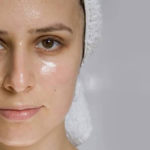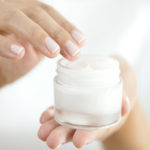What is mung bean sprouts?
Mung bean sprouts are a popular type of sprout in Vietnam, with simple cultivation and quick growth. Mung bean sprouts are usually grown from green beans, but can also be grown from soybeans, black beans, or red beans, but mostly the mung bean sprouts we buy in the market are grown from green beans soaked in water.
Mung bean sprouts are grown by soaking beans in water for 3-6 hours and then fermenting them in bottles, jars, or bundles for about 4-5 days and watering them regularly. After mung bean sprouts have sprouted about 3-4 cm, they can be used to prepare dishes.
Mung bean sprouts have a mild sweet taste and are a versatile ingredient that is easy to find and cook. We can eat them raw, make salads, stir-fry dishes, soups, etc.
According to the US Department of Agriculture, 100 grams of mung bean sprouts contains the following nutrients:
Energy: 23 kcal
Carbohydrates: 2.1g
Protein: 3.99g
Fat: 0.69g
Fiber: 1.9g
Potassium: 79mg
Calcium: 32mg
Phosphorus: 70mg
Magnesium: 27mg
Iron: 0.96mg
Choline: 14.4mg
Vitamin C: 8.2mg
Vitamin B3 (Niacin): 0.481mg
Vitamin B2 (Riboflavin): 0.126mg
Vitamin B1: 0.076mg
Phosphorus: 70mg
Zinc: 0.92mg
Vitamin E: 0.02mg
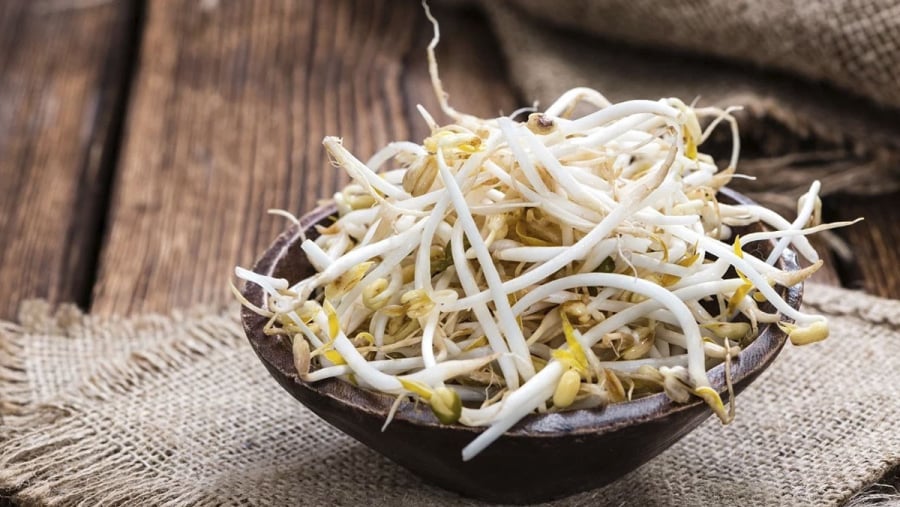
Health benefits of mung bean sprouts
Effective remedy for constipation
With its rich vitamin content, mung bean sprouts can neutralize free radicals and detoxify the body from various sources, including thallium.
Mung bean sprouts also contain fiber, which, when mixed with parsley, is safe and effective for treating constipation in children and the elderly. Eating mung bean sprouts can help treat conditions such as night blindness due to vitamin A deficiency, tongue and mouth inflammation, and testicular inflammation due to vitamin B2 deficiency, and anemia due to vitamin C deficiency, etc.
Regular consumption of mung bean sprouts helps with effective weight loss
Mung bean sprouts have low-calorie content, making them an excellent food for dieters or weight loss. Mung bean sprouts are rich in nutrients, vitamins, and protein. The fat in mung bean sprouts is abundant but does not cause bloating, making it particularly suitable for people who work mentally a lot. This vegetable fat also has the effect of treating high blood cholesterol.
From a nutritional perspective, the low calorie content in mung bean sprouts is 8 calories per 100g while containing a rich amount of fiber, which helps promote intestinal motility and has a laxative effect. Thanks to these characteristics, mung bean sprouts are effective for weight loss.
Mung bean sprouts are great for the skin
In addition to the nutritional value for health, mung bean sprouts also have beauty benefits. Mung bean sprouts contain antioxidants that help prevent the aging process. Vitamin E in mung bean sprouts helps absorb ultraviolet rays and remove blackheads on the face. According to some studies, daily consumption of mung bean sprouts helps reduce dryness and wrinkles on the face.
Mung bean sprouts supplement alkaline for the body
Some foods contain small amounts of toxins that can disrupt the body’s alkaline balance. Mung bean sprouts will help you do this to protect a healthy body and maintain a balance of minerals easily.
Mung bean sprouts supplement essential fats
Mung bean sprouts contain EFAs, essential fatty acids for the body, ensuring basic functions. An appropriate amount of mung bean sprouts in the daily diet helps you supplement the necessary fats to avoid infections and enhance immunity.
Moreover, mung bean sprouts are a living food, so they contain countless molecules of necessary oxygen to nourish cells. This abundant source of oxygen helps prevent the invasion of harmful viruses and eliminate harmful bacteria. You can supplement mung bean sprouts in your daily diet to provide a reasonable amount of oxygen and protect your body.
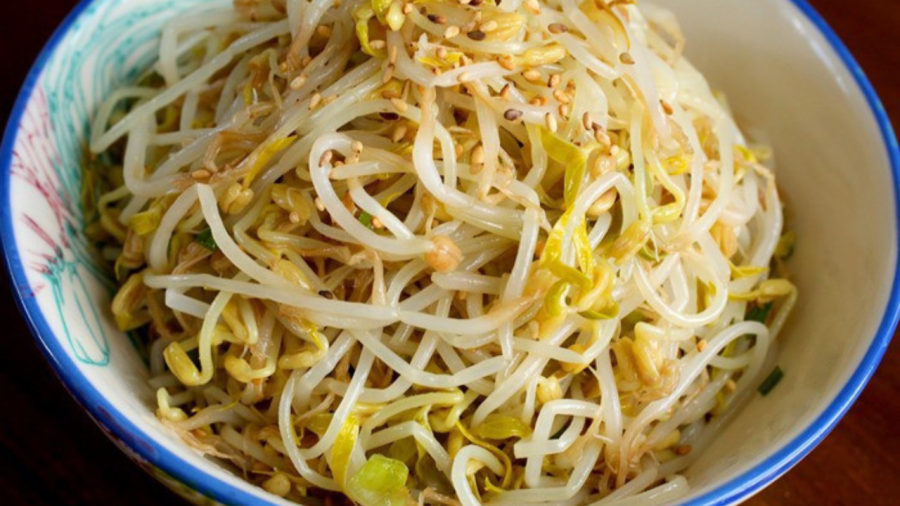
Precautions when consuming mung bean sprouts
Avoid stir-frying mung bean sprouts with liver
Nutrition experts suggest not stir-frying mung bean sprouts with liver because they are incompatible. Nutrition experts explain that mung bean sprouts contain a lot of vitamin C, and if we stir-fry or eat pork liver with mung bean sprouts at the same time or in close proximity, vitamin C will be oxidized and the dish will lose its nutritional value.
Do not eat raw mung bean sprouts
According to nutrition experts, mung bean sprouts are delicious but have a high risk of poisoning (not to mention mung bean sprouts soaked and fermented improperly and not guaranteed hygiene). Therefore, when using mung bean sprouts, it should be blanched in boiling water, washed, and soaked in clean water with a little salt.
Avoid frequent consumption of mung bean sprouts
Mung bean sprouts are a type of vegetable with many nutrients, and if this vegetable is made in a traditional way of soaking and fermenting, it is very clean and safe.
However, nowadays, for economic benefits, mung bean sprout makers often use some stimulants to increase productivity. Therefore, eating “dirty” mung bean sprouts for a long time will have many repercussions, including dangerous diseases such as cancer.
Do not eat on an empty stomach
Although mung bean sprouts have a cooling and safe nature, those with symptoms of cold hands and feet, weak strength, back and leg pain, loose stools should not eat them because the cooling nature of mung bean sprouts can worsen their condition. Especially, do not eat on an empty stomach as it is not good for the stomach.
People with cold hands and feet, weakness
If you frequently have cold hands and feet, weak strength, back and leg pain, loose stools, eating mung bean sprouts will make the condition worse.
People taking medication
Mung bean sprouts have detoxifying properties, so they can reduce the effectiveness of certain medications. Therefore, if you are taking medication, you should not eat mung bean sprouts or eat them close to the time of taking medication.
Pregnant or breastfeeding women
Pregnant or breastfeeding women should not eat raw mung bean sprouts. As mung bean sprouts are made at a temperature of 35°C, it is an ideal environment for bacteria to grow. If you want to eat mung bean sprouts, you should blanch them in boiling water or cook them thoroughly.
5 Steps To Achieve Flawless Skin By Facial Steaming For Acne Treatment
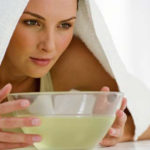 Skin By Facial Steaming For Acne Treatment’>
Skin By Facial Steaming For Acne Treatment’>Having clear and radiant skin is the ultimate goal of many women, and sauna steaming is a popular choice among the numerous available methods. Let’s explore the proper technique to steam facial skin for acne relief and a more luminous complexion with Dien May Xanh.


























